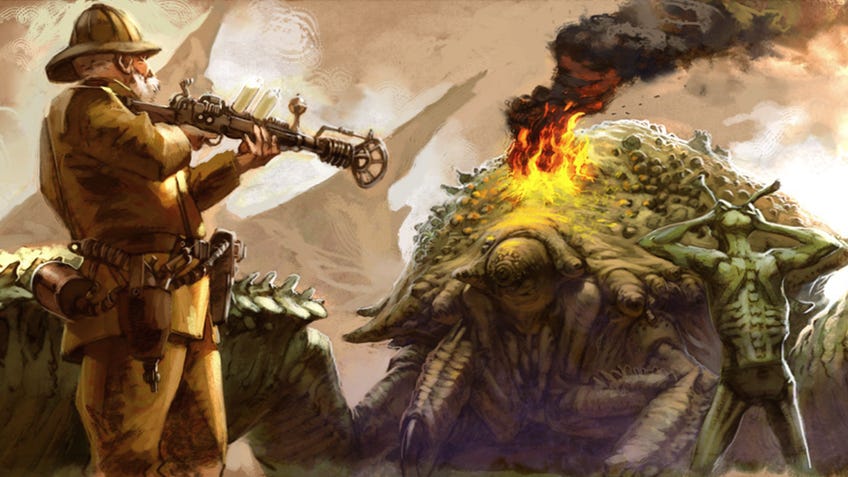‘D&D takes itself so seriously’: Dr. Grordbort RPG creators on sending up 5E and swapping magic for science
Plus, grab an exclusive quickstart adventure ahead of Scientific Adventure Violence’s Kickstarter campaign.
The satirical universe of Dr. Grordbort’s is headed to the tabletop in a new tabletop RPG, bringing creator Greg Broadmore’s lively piss-take of pulp sci-fi, the British Empire and capitalism to Dungeons & Dragons 5E next week.
Dr. Grordbort’s Scientific Adventure Violence swaps the classic spell-casting of D&D for the retro-futuristic tech of Grordbort’s, replacing magic with rayguns with questionable pseudoscientific power sources and even more questionable reliability.
The upcoming RPG sets players loose in the familiar-yet-unfamiliar solar system of Broadmore’s tongue-in-cheek universe, inspired by Victorian imperialism, which envisions an interplanetary British Empire able to spread its influence to Venus thanks to the likes of buffoonish explorer Lord Cockswain.
Like Broadmore’s original props and comics - which now span almost two decades of Grordbort - the tabletop RPG takes shots at sci-fi classics from Buck Rogers to Flash Gordon in its lampooning of toxic masculinity, sexism and colonialism, while also aiming to capture the zany feel of the setting’s technology.
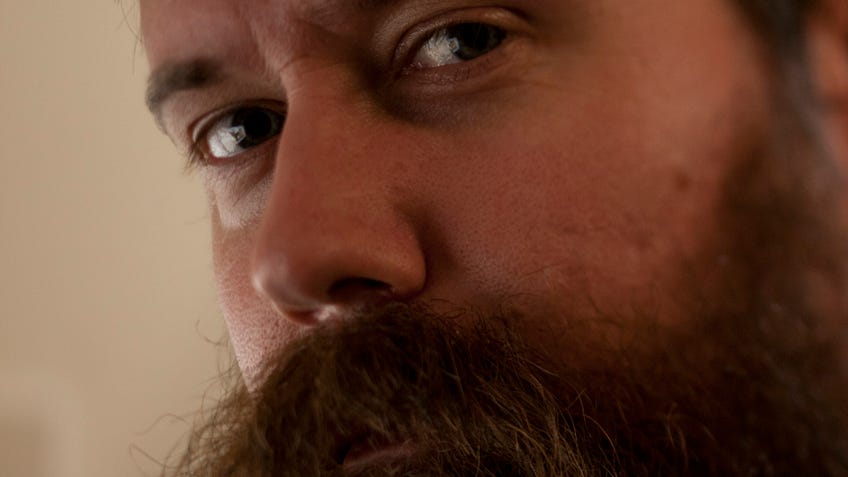
Ahead of Scientific Adventure Violence’s Kickstarter campaign on August 23rd, I spoke to Broadmore and co-designer Brian Saliba of Crowbar Creative about bringing Dr. Grordbort to 5E, tackling difficult topics in a tabletop RPG and why it’s taken so long for a Dr. G RPG to emerge - read our conversation below.
If you're interested in trying the game for yourself, you can grab the latest Dr. Grordbort’s Scientific Adventure Violence quickstart set - featuring a full adventure and two new ready-to-play characters - exclusively through Dicebreaker below. (If you haven't played any of the adventures to date, you can jump straight in here without a problem!)
- Dr. Grordbort's Scientific Adventure Violence - Quick Start 5 Adventure Path
- Ruffianator 3800 G and Human Scapegrace - pre-gen character sheets
Like previous quickstart sets released for the game, you’ll need to grab Quick Start 1 (which you can pick up for free) to have the necessary rules and introductory materials. (If you missed the previous quickstart release, find it here!)
How did a Dr. Grordbort’s RPG come about?
Brian Saliba: This goes back to 2014, believe it or not. I visited Weta Workshop at that time. In the gift shop, I picked up the Dr. G books. I'd never heard of it. I hadn't seen it. But I just fell in love with the art and took it home, devoured it - the books, I mean - and then moved overseas for a couple of years. All that stuff kind of went into storage along with everything else that I had.
When I got back, I moved around some more. When I finally got settled where I am now, I recovered all of those things I had in storage. As I was going through it, out came Dr. G and I thought, "Oh my gosh, I'd forgotten - I love this stuff! I want to do something with it.” So I emailed Greg and he wrote back almost immediately saying, "Hell yeah, let's talk." And that's that's how it all started.
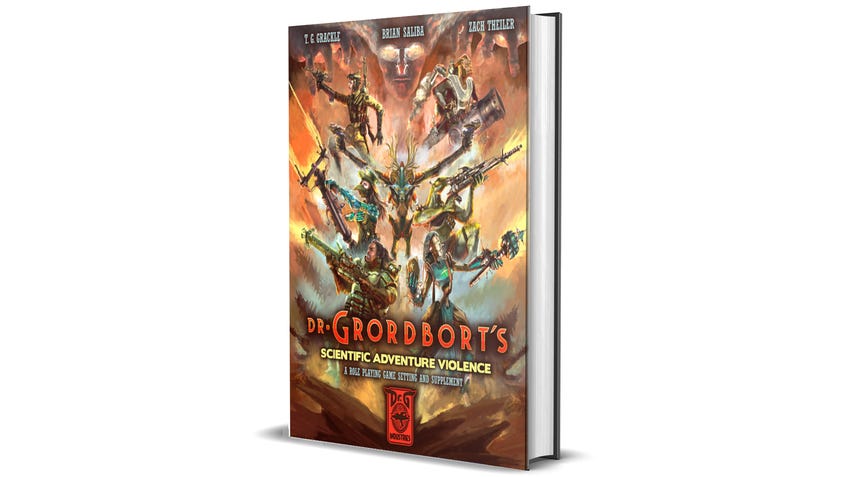
After that rediscovery, how long did Scientific Adventure Violence take to really come together and get into the shape you wanted it to be?
Saliba: We're probably about a year, maybe a little more, from the time that I first reached out to Greg. And then he brought in [Weta founder] Richard Taylor and all of their team to kind of discuss what it might look like. Then I had to find a publisher for it. Because I felt like for something like this, it was gonna be a pretty heavy lift just doing the development. I didn't want to tackle the publishing side of it as well. So I reached out to Exalted Funeral and they were immediately interested and supportive. They got involved and have been handling that side of things while we've been developing. I say ‘we’ because I immediately reached out to friends and colleagues to actually help in the writing and developing of it.
The way we've done it, it's tricky. Particularly the way that we've chosen 5E as the system, but this is a universe in which magic doesn't exist - this is the age of science. I knew there was going to be a lot of work marrying those two things up and not having them coexist, but almost reshaping magic into a shape that would fit Greg's vision for the world.`
As you mention, this is built on D&D 5E. 5E is obviously super familiar to a lot of people and very popular. Did you ever consider going with another system, an original system, or off the bat was it always going to be a 5E creation?
Saliba: It was not always going to be 5E. Our main goal was just making sure that we stay true to Greg's vision, to the source material. And by that I mean primarily the comics and the books that they published.
We talked with Greg early on about a few different ways we could go and creating our own system or finding an existing system. We landed on 5E for a few reasons. One of which is the commercial potential. But that wasn't the only factor. That was one of several considerations. Another one is the fact that we, as creators, really like the challenge of trying to create a system or create a roleplaying game supplement in which there's no magic. Like, how does magic become science? That was just fascinating for us.
We also thought that there was a space in the 5E universe for something like this. By that, I mean its tonality, which is, as much as anything else, what sets it apart. It's just very different tonally - at least from things that I'm familiar within 5E. It's self referential, it's highly satirical. It chooses to deal with tricky issues by having them exist and lampooning them, as opposed to trying to cut out tricky issues completely and leave only a kind of issue-less setting. That was really interesting. We thought there might be some space in the 5E realm for something that does that.
5E just seems to take itself very seriously in a way. Whenever something takes itself too seriously, it's ripe for a send-up.
OSR [the Old School Renaissance genre of RPGs] has some stuff like that already. But, at least as far as I know, 5E just seems to take itself very seriously in a way. I think Greg would agree that whenever something takes itself too seriously, it's ripe for a send-up. This isn't a complete send-up of roleplaying games - it’s a functioning roleplaying game and it can be played very seriously if that's what you want to do. But it also has a lot of elements in terms of chaos and lethality that maybe don't exist as much in 5E. So we thought it might be fun for players who have been exposed to the hobby only through 5E to kind of see a different way of approaching roleplaying games.
Greg Broadmore: I've been playing Dungeons & Dragons since I was about 13 or something like that. And I'm an old human being now. So that's a long time ago, that was in the ‘80s. But it always felt right. The magic thing is super interesting, because Dr. Grordbort's is science-fiction, but actually only science-fiction on the surface. That's a veneer. Really, it's a social parody and a satire. Science might well be magic in the universe.
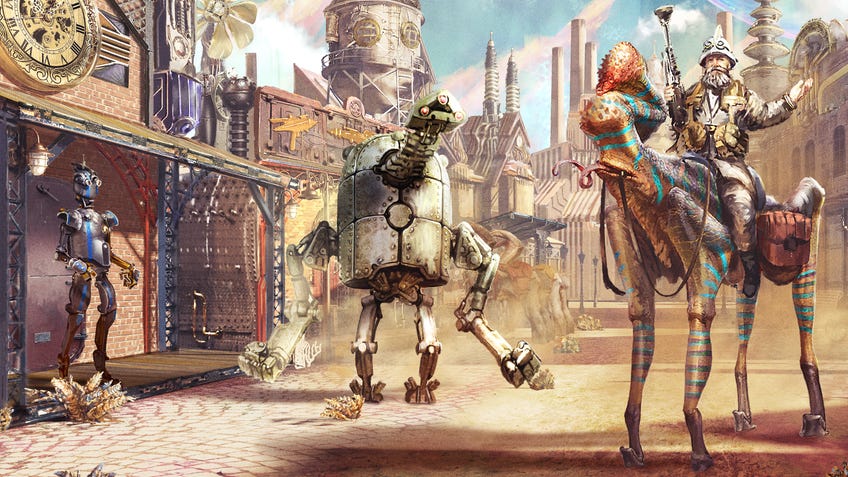
How did you ultimately tackle the challenge of replacing magic in 5E with science?
Saliba: We had a few different pitches to Greg, like, "Okay, here's what it looks like, if magic is simply reskinned to science. Here's what it looks like if magic coexists; there are people who can do magic things, but there's also the science. And here's what it looks like if there is no magic, there is only science and science is wondrous, and can create marvellous effects and is dangerous to mess with and not fully explained or understood. But there is no quote-unquote, magic." He was pretty unequivocal that no, in Dr. G, it's the third option. There is no magic. There are no weird people, no wizards doing things.
That gave us a clear direction, but also our challenge then was, okay, so what in the world is a druid? What in the world is a sorcerer? What did these look like? For us, it came down to the equipment. Greg has described the universe in many ways springing from the rayguns that he designed and created. So for us, that was always a kind of lodestar: let's go back to the ray guns and the gadgetry. What we did was map all of the magic to specific equipment. So you can still cast fireballs and lightning bolts and teleport and cast weird druid things, but you have to have a piece of equipment in order to do it.
Every time you cast a spell, there's always a chance it goes completely pear-shaped. Anything from the machine squirts a bit of hot tea in your eye to it completely blowing up in your hands and going thermonuclear.
We wanted to make sure that what you got in this setting was only what was kind of different, what you really needed to know. Not a total overhaul of the entire system, because at that point we might as well just use our own system, not use 5E. So we tried very hard to make sure that if you play 5E, this is going to be easy to pick up because almost everything is the same mechanically. But there's a tweak here and there. You might not need spell components, but you need this particular defibrillator to do this thing or you need this particular raygun to cast this spell.
Since you're using a piece of equipment, every time you cast a spell, there's always a chance it goes completely pear-shaped. Which is one thing that's significantly different about this setting than 5E. You don't just channel Phlogiston [combustible fire-like ammunition inspired by the real-life phlogiston theory] through this weird piece of equipment and everything goes off without a hitch necessarily. Even for the simplest of spells, if you're messing with things like Phlogiston and this weird sparking, poorly-understood piece of technology, you have a chance of malfunctioning - and if you malfunction, then you're rolling on a malfunction table. That can be anything from the machine squirts a bit of hot tea in your eye to it completely blowing up in your hands and going thermonuclear.
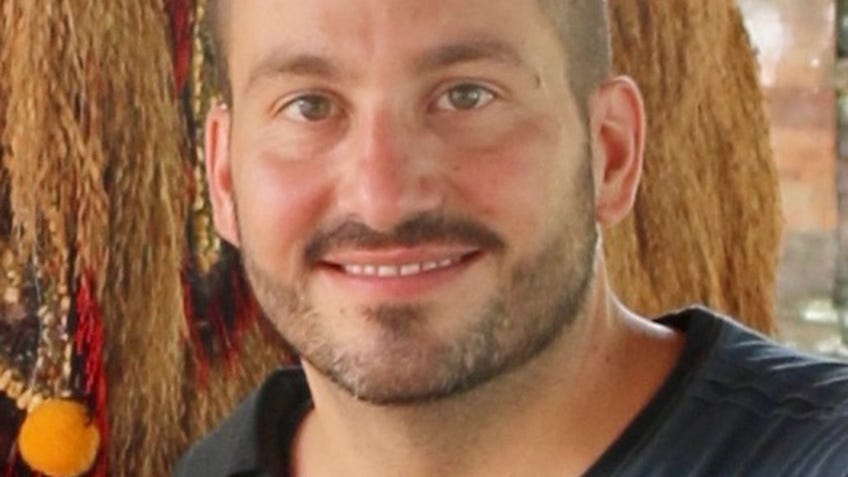
Dr. Grordbort’s is satire; it's parody, it's homage. Many of its reference points - Buck Rogers, Flash Gordon, pulp comics - are both from a time and reminiscent of a time that is soaked in things such as colonialism, imperialism, sexism and violence. In the comics and Grordbort's lore, you send that up. When it comes to an RPG where players are then given agency, how do you tread that line between something that is satire and meant to lampoon and to criticise, but potentially uses the imagery, language or framework of something that is problematic or harmful to some degree?
Broadmore: To me, roleplaying games are a form of drama. They're fiction that we create. And fiction and drama are built off of conflict. You need conflict, basically, otherwise there's no real drama at the end of the day. I love, personally, the idea of being a character thrown into a world that is full of friction for you, that is not necessarily friendly to you, that has all these problems.
You might go into it as a female character and find that it's an incredibly sexist world. But that is the challenge; that is the fun, that's where the drama and the friction will come from. You could go into this world as a robot and be thought of as a second-class citizen, right? And you've got your allegories directly to all the kinds of brutalism that happens to people around the world who are minorities or for whatever reason, and the same thing happens if you're Venusian or whatever.
I'd hope that people would want to not play in an idealised world where everything's perfect for them, but a problematic world where they are the ones trying to change the outcome.
To me, if it was a perfect world where all those problems were solved, what would you be doing? Where's the interest in that? I don't find that exciting. There's no drama in there. So I find going into a problematic world - to use the modern terminology for it - that's the exciting part. That's where the drama is. That's where the friction is. And where creative players will be able to create more interesting stories. There's more risk, as well. I'd hope that people would want to not play in an idealised world where everything's perfect for them, but a problematic world where they are the ones trying to change the outcome.
Saliba: Colonialism, patriarchy, sexism, exoticism, speciesism, consumerism. All of those things are in the source material. So our challenge was how to translate those things into a roleplaying game without just providing an avenue for indulgence and bad behaviour. There's obviously the Session 0 and safety rules and Lines and Veils that we recommend.
We say very plainly upfront that this is a game for adults; very specifically, adults who aren't offended by satire. And if you are, it's not the game for you. And that's fine. But one way to tackle tricky subjects is to excise them. Another way is to present them and lampoon them. That's a lot of what happens in the source material and in this game.
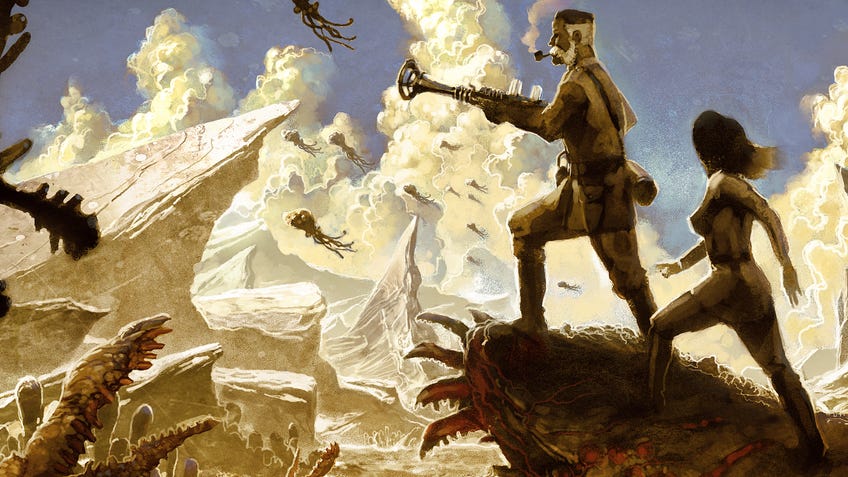
As with a lot of games that have a similar approach, all these things are background elements. There's so much other adventure and storylines to get caught up in, you really don't have to deal with that if you don't want to. If your table isn't interested or somebody's going to be put off by that, it's very easy to explore other elements. You can just have fun decking out your party in rayguns and go blasting monsters. Those elements are there to be explored if it's of interest, and everybody around the table is on board from the beginning. But I wouldn't call them kind of integral factors or essential. You can cut that stuff out and still have fun blasting stuff.
Everybody has different sensibilities with regard to what they want to explore in their free time with their friends. So the stuff is in there, but we did try very hard - and this is in keeping with the source material - that when a lot of those difficult issues are presented, it's satirised. We don't celebrate colonialism or sexism or toxic masculinity. The kind of mascot of Dr. G is Lord Cockswain. He's kind of the epitome of all of those things rolled into one. And he's not presented as a hero. And nor is the British Empire, which is out dominating planets and subjugating people, presented as a great force for good by any means. Another steer from Greg was neither are the freedom fighters presented as wholly good either. It's not like big bad evil empire and plucky fighters that are all completely pure and good throughout.
There's a lot of grey area and how much a group wants to get involved or play in those interesting areas is up to them. They just need to have that conversation beforehand and make sure everybody's on the same page.
Greg, with the foundation now laid, could you see yourself telling Grordbort’s stories that are specifically for the roleplaying game, going beyond the established lore and stories you've already told in the comics?
Broadmore: As these guys expand it out and provide that sort of platform, then I think that is a really exciting opportunity. At the moment, I'm in the middle of developing another graphic novel. I hope I'll have finished it by the end of this year or early next year. But once I'm done with that, I need to get back into Grordbort's.
It's one of those things for me - I've had so many different ways of approaching it, which is exciting. I've roleplayed since I was a kid. To me, it's kind of astounding that we've never made a roleplaying game before. It's one of those core things to my childhood. So I'm very excited that we're finally doing it now and that I get to play in that world as well.
This interview has been edited for length and clarity.
